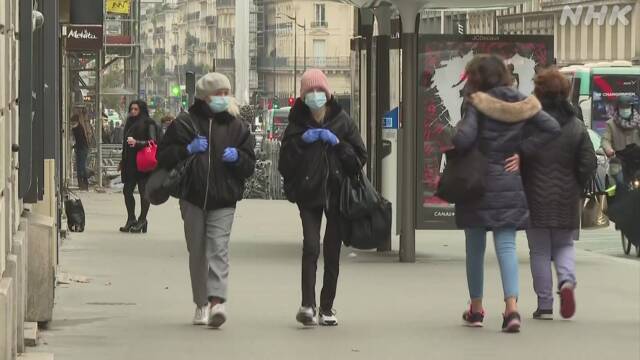France: Uniform restrictions on going out nationwide due to re-expansion of infection
French President Emmanuel Macron has announced that he will impose uniform restrictions on going out nationwide for more than a month from the 30th of this month in response to the rapid spread of the new coronavirus infection.
In France, the infection with the new coronavirus has spread rapidly again, with the highest number of infected people in Europe, exceeding 1.2 million.
The number of deaths per day exceeded 500 on the 27th, and the situation in the medical field is becoming more serious.
President Macron gave a television speech to the public from 4 am on the 29th of Japan time, saying, "Now, if we do not brake the spread of the infection, the hospital will soon fill up and doctors will have to choose patients to help." He expressed a strong sense of crisis about the current situation.
After that, it announced that it will restrict going out nationwide for more than a month from 30th of this month to 1st of December, except for commuting and health reasons.
Only stores that handle daily necessities will be open, and restaurants will be closed.
Details will be revealed on the 29th.
The restrictions on going out will be the first in five and a half months since this spring.
However, unlike spring, elementary and junior high schools were not closed.
On the other hand, for higher education institutions such as universities, only online classes are allowed.
In France, the economy has been severely hit by the spring outing restrictions that lasted for nearly two months, and President Macron said, "The economy should not stop and collapse," and even among the outing restrictions, manufacturing, agriculture and construction He emphasized that the business will continue.
The French government has tried to survive with more lenient measures such as curfew to reduce the impact on the economy, but the spread of the infection has not been stopped and the regulations have been further tightened.
Parisian restaurant clerk "really tough"
At restaurants in southern Paris, when it was announced that clerk and people who visited the restaurant would watch President Macron's TV speech and be restricted from going out nationwide, a small screaming voice and sigh would be heard from inside the restaurant. It was done.
A male clerk said, "It's really tough because I don't know how to earn income in the future. Even after the first outing restriction, sales have returned to only about 50%, and in this situation it will be restricted again. Is the worst. I will talk with other clerk tomorrow about the future. "
A female guest said, "I'm disappointed that I'll be restricted from going out again. I'm worried that many restaurants and bars will collapse and disappear."
What is the current status and background of the rapid spread of infection?
In France, during the summer vacation, the infection of the new coronavirus began to spread again around August.
The number of infected people per day was around 1,000 at most in July, but this month it increased to 20,000 and 30,000, and on the 25th of this month it exceeded 52,000.
The number of infected people has increased by more than 600,000 this month alone, the highest number in Europe.
The number of people who are being taken to the intensive care unit is increasing rapidly as the infection spreads.
The proportion of patients with the new coronavirus in the intensive care unit was less than 10% at one point, but as of 27th of this month, it has approached nearly 60%, increasing the burden on the medical field.
On the 27th of this month, more than 500 people died from the virus infection, which is about the same level as in April.
One of the reasons why the infection has spread again is the lack of thorough preventive measures.
In France, the use of masks in public places has become widespread, but a survey by the French Public Health Service found that more than 70% of people avoided gathering with people in mid-May, just after the strict restrictions on going out were over. However, in mid-September, the ratio dropped significantly to just over 32%.
Of these, only 22% are young people between the ages of 18 and 24.

